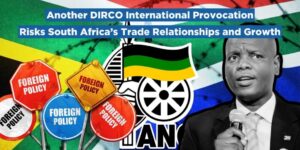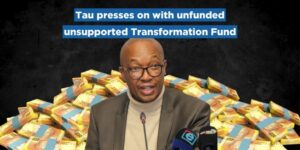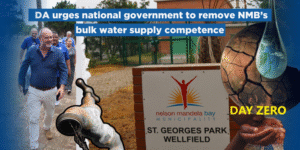The following statement was delivered by DA Shadow Minister of Finance, Geordin Hill-Lewis MP, during a press conference on the DA’s expectations ahead of the Finance Minister, Tito Mboweni’s Medium-Term Budget Policy Statement. Hill-Lewis was joined by DA Shadow Deputy Minister of Finance, Dion George MP.
- Please find attached a full preview document here.
In an already extra-ordinary year, this week the Finance Minister, Tito Mboweni, will deliver his third budget of 2020.
While economic conditions have changed dramatically since the first budget was delivered in February, the core responsibility of the National Treasury has not.
The Treasury, and the Finance Minister, must restore South Africa to a sustainable debt path and re-establish fiscal discipline.
Equally important is protecting essential public services from deep budget cuts. These two goals are related. If we spend more on interest on debt, we will have less to spend on essential services.
And if spending is focused on wasteful projects and failing state companies, there will be less for essential services.
The Minister and his excellent Treasury team know this full well. That is why the Minister committed the government to achieving primary balance and debt stability by financial year 2023/24.
In that budget, the Minister set out clearly the risks associated with failing to close the mouth of the hippo – the yawning gap between government revenue and government expenditure.
This was the so-called “active scenario” requiring meaningful progress on wide-ranging economic reform to reorient the economy for growth.
The active scenario would require some difficult and painful decisions in the short term – most notably, deep cuts to the public wage bill, and ending the cycle of perennial bailouts for failing state entities.
These then are our core expectations for the medium-term budget policy statement:
- The Minister must show a credible path to debt stabilisation, and in the longer term, to debt reduction
- The Minister should commit himself to a formal legislated debt ceiling, ideally by supporting the DA’s Fiscal Responsibility Bill
- The Minister must protect essential public services from deep budget cuts, by focusing cuts on the public wage bill and through a root-and-branch reassessment of government spending
- The Minister must hold the line on bailouts to failing state entities, and should refuse any further bailout of South African Airways (SAA)
Failure to Reform:
The consequences of not achieving the “active scenario” are a full-blown sovereign debt crisis that would see South Africa cede a portion of policy sovereignty to international lenders, be they based in Beijing or Washington. More than that – far deeper cuts across every public service, affecting the poor above all.
Cabinet has so far paid little heed of Treasury’s warnings.
Like the stubborn patient who refuses to deal with a gangrenous foot, and so eventually loses the entire leg, the ANC has refused to take the action now that would prevent far more painful consequences later.
There has been little meaningful progress on economic reform, national debt continues to mushroom, and South African Airways (SAA) is set to receive another R10.5 billion bailout.
We expect that the trend in Mboweni’s speeches will continue of ever more dire warnings about what is coming, followed by inadequate action to change course. This means that we do not expect the targets in the “active scenario” to be met, and that Minister Mboweni will try to find ways to retreat from these targets.
The More Fundamental Question:
Lying behind various debt scenarios and fiscal targets, there is a more fundamental underlying problem that will continue to hobble any latent recovery.
South Africa’s economic recovery depends on a simple yet crucial choice that the ANC must make: state ambition versus giving power to the people.
The ANC must abandon its ambition for a state-led economy, which is smothering the entrepreneurial talent of South Africans.
In what was to be his final public engagement before his untimely passing, Professor Daniel Plaatjies (to whom we pay tribute for his long and distinguished contribution) spoke just 3 weeks ago of the ANC’s failed ambition to build a developmental state. He concluded that the edifice constructed by the ANC is developmental in name only – all of the ambition, with none of the substance.
This ‘state ambition’ with low capabilities and corruption has been a lethal combination: it has nearly crippled South Africa.
In pursuit of this ‘state ambition’, the ANC has expanded public spending massively.
This gamble has not paid off. South Africa now has high debts and nothing to show for it.
In pursuit of this ‘state ambition’, the ANC has given endless public financial support to state-owned companies whose control they have also guaranteed through cadre deployment.
Now, nearly every state-owned enterprise without exception is a failing businesses, with unreliable or collapsing services.
A bloated public sector delivers increasing salaries and declining services.
Roughly half of all South Africans above the age of 18 live below the upper-bound poverty line (R1 227) and, by law, they are not permitted to escape it. South Africans are required to sit at home rather than accept a job for less than R2 491 a month in the private sector.
Finally, the services paid for by taxpayers are broken. In fact, they are so broken that after paying the government, taxpayers pay the private sector again to actually deliver them the services they need – private security, private healthcare, private education, private transport, etc.
This is the legacy of the ANC’s ‘developmental state’ ambition.
The South African economy requires a radical reorientation from state ambition towards giving power to the people.
South Africa already has the natural endowments, entrepreneurial talent, and ideas to drive an economic renewal, but it requires a government willing to unleash it.
A growing economy enables us to provide better and more meaningful welfare support to the poor and the unemployed – the kind of support that actually gives you an opportunity to escape poverty and become independent. Not support so paltry, important as it is, that it keeps recipients trapped in a cycle of government-induced poverty. A basic income becomes more and more feasible in the context of a growing economy where fewer people would be out of work.
If South Africa continues with state ambition over giving power to the people, we will forever be trying to do more, but with a declining base of taxpayers to provide the revenue needed to fund more.
Changing direction will not be easy. South Africa has built up significant momentum towards economic ruin. It can be done, but it requires tough choices to overcome inertia.
The document we release today highlights the tough choices South Africa needs to make in order to give power to the people.
SAA:
The SAA bailout is why this budget is ultimately bound to disappoint. It represents the failure of the ANC to make the choice to move away from state ambition to giving power to the people.
Besides insiders and vested interests, there is no one left in South Africa still trying to make a case for why SAA should be bailed out again. The ANC does not even try to make a case for it.
And yet, another bailout is coming. R10.5 billion, on top of R16.4 billion in February.
This is perfectly symbolic of the choice of ‘state ambition’ over empowering people.
It is a morally indefensible choice to make.
In the context of the scale of financial stress and personal suffering faced by so many South African families right now, spending should be prioritized for protecting essential services, or providing greater relief.
This is the choice being made:
- R10.5 billion could fund, on average, a little more than one additional month of TERS support for families who are still not earning their full pre-lockdown salaries.
- R10.5 billion represents 130 new schools
- R10.5 billion represents over 1.5 times the entire annual budget of the National School Nutrition Program
- R10.5 billion represents over 80 000 education degrees.
- R10.5 billion represents 13 new 300-bed district hospitals.
- R10.5 billion represents over 440 new green community clinics.
- R10.5 billion represents over 27 000 medical degrees.
- R10.5 billion represents over 66 500 RDP houses.
That is the choice the ANC is making: SAA above SA. State ambition above empowering people.
More than R65 billion in public money has been given to SAA since 1999, without anything to show for it. The latest request for R10.5 billion to “restructure” the company will push the assistance given to SAA over the R75 billion mark.
Western Cape Premier Alan Winde summed it up perfectly this week when he said “…we don’t need state funded planes, but we do need working trains…we don’t need chicken or beef being delivered in the skies to those who already have an income. But what we do need is good nutritious food delivered to our children so we can eradicate extreme hunger”.
And that is why we are so committed to raising public awareness about how wrong this choice is. We will continue to escalate our campaign against this bailout – both in the hope of stopping it, but also so that the ANC is held accountable.




